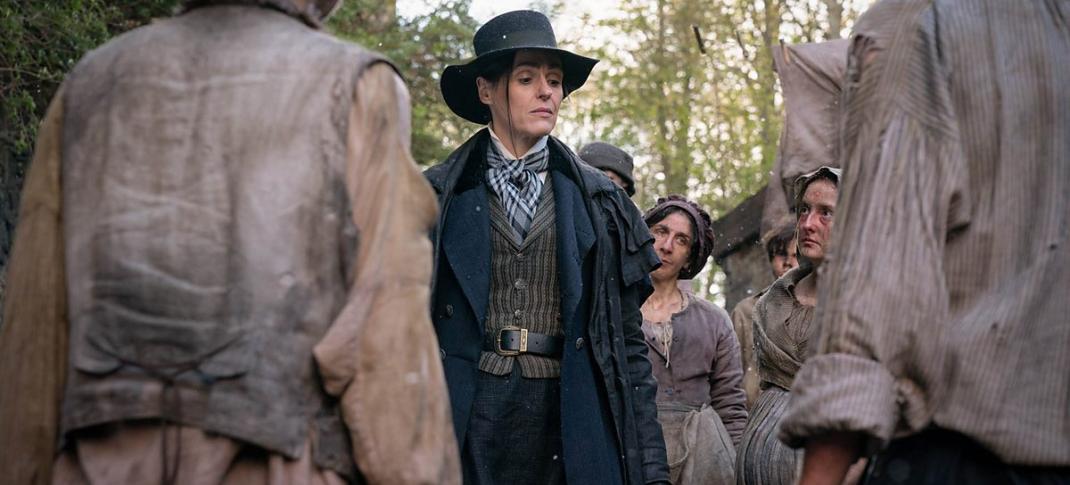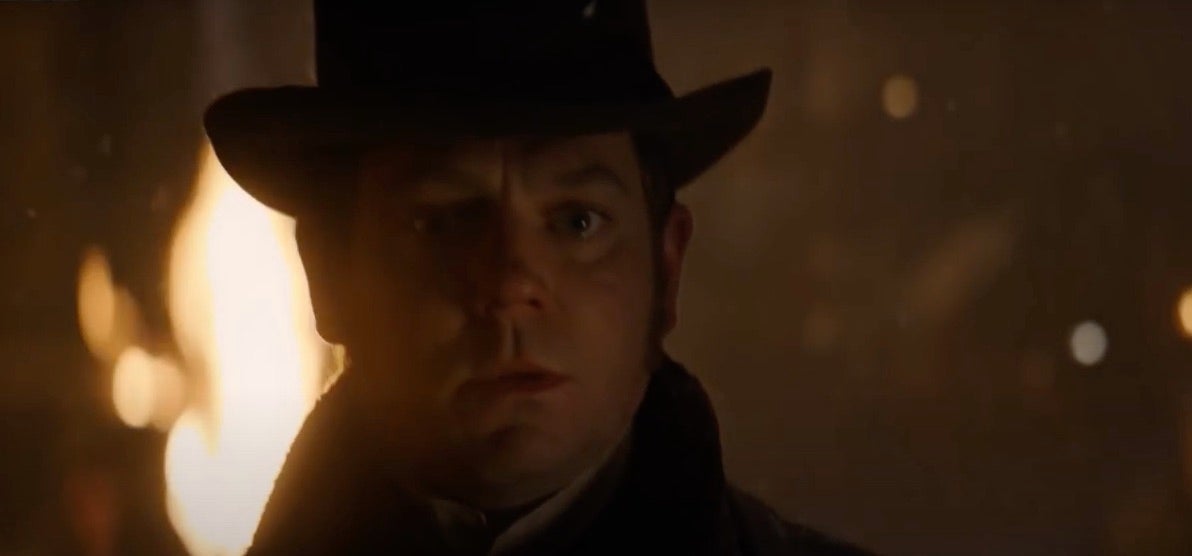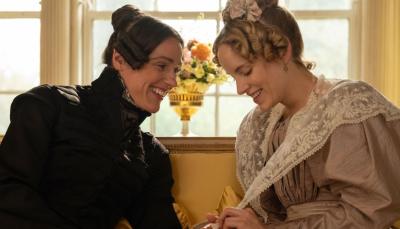'Gentleman Jack' Season 2, Episode 5 Recap: “A Lucky and Narrow Escape.”

It's the 1835 national election, and Halifax is in a state of unrest. Despite the passing of the 1832 Reform bill, which expanded the vote and regulated election procedures, the town is in an uproar. Tory (Conservative, "blue") candidate James Stuart-Wortley (Alex Bhat) faces a crowd of protestors who drown out his speech with blaring brass instruments. Lister, old school Tory that she is, sends Shibden Hall footman Matthew to entice tenants to vote Tory. But it's hard times, with freezing weather (we see Lister break the ice in a pitcher to wash her face) and quarterly rents due. Radical sympathies are strong, and their candidate is doing better than anticipated in the election. The Tories are in trouble, as are the Whigs, but win the election*.
(*This is fictional. You can see the 1835 Halifax election results here––the Whigs held their seat, but significantly, the Tories were just one vote ahead of the Radicals.)
At Shibden Hall, Aunt Lister's health is declining, and housekeeper Elizabeth, who has arthritis, can barely cope. After an unsuccessful and painful "manipulation" by their doctor, followed by a castor oil recommendation, Lister advises Elizabeth to visit her sister to rest but not before the housekeeper realizes that she can't afford to laze as others can. This is a reference to her Aunt, but Lister chooses not to take it as such, although both seem shaken and subdued by Elizabeth's rare outburst.
There is progress on the property division between Ann and her sister Elizabeth. A letter arrives with the news several tenant farmers are in arrears on their rent. The recommendation is that they should be evicted. While Ann and her land manager Samuel Washington discuss the practicalities of eviction — hiring a bailiff and finding new tenants — Lister keeps quiet, allowing Ann autonomy. Later, when they are alone, Ann expresses discomfort. She is convinced that her sister's husband is behind the evictions. Ann chooses the moment to ask why, when she returned from the disastrous visit to Mariana, Lister told her she would never leave again. Lister, who has still not admitted her infidelity, says it was because she missed her so much.

At dinner, Marion announces that Mr. Abbot, a wool producer, who we met briefly in Season 1, and who seemed to like her, is coming to call. Lister sneers — he's "a chump who dumped you" — and refuses to acknowledge his visit. Marion tells her sister that Abbot proposed, and their father already knows. He is an entirely respectable, well-regarded, and ambitious man with an income of £2,000 yearly. Lister considers this a grave mistake and tries to bully her out of it. Marion is a Lister. He is trade. Does he understand that Marion will have no claim on the Shibden estate or funds? Moreover, if she marries him, the family will alienate her from the family for marrying beneath her. It's Lister at her worst.
Marion tries to stand up to Lister. She likes him. It's her last chance to marry and have children, and she lets Lister pat her on the head and instruct her not to tell their Aunt (who would almost certainly have something to say about it, and in Marion's favor). Meanwhile, Halifax is rioting, with buildings fired, shop windows smashed and their goods looted, and houses, including the vicarage, attacked. The Tories are ahead by one point. Will rioters come to Shibden Hall? Washington, who's seen the damage first hand, assures them Shibden Hall will be safe and that he's hired a bailiff to carry out the evictions. Ann looks very upset.
The following day Lister, armed to the teeth, and carrying large amounts of cash, leaves for Halifax on foot and dressed in understated male attire. Even so, a group of ragged and poor citizens surrounds her, who asks her if she's voted black (Radical). She tells them she's in mourning for the damage in the town and walks on. She's in town to collect rents and close on another piece of land, which she's been planning for some months. She plans to find a tenant who will obediently vote Tory. The plans to convert Northcote to a hotel are underway, with an architect coming to evaluate the property.

She also visits John Waterhouse, Chair of the Navigation Subcommittee. He is shaken by the damage to the town, estimated at £10,000, and fearful for his family's future. There is poverty, misery, and rioting, all over Yorkshire and Lancashire. Perhaps, he suggests, the Radicals have a point.
On the way home, she meets William Hardcastle (Joel Morris), one of her tenant farmers whose son, Henry, was severely injured in a traffic accident and is now disabled. Lister is paying for his education. Now, she tells Hardcastle should know she has long suspected Jeremiah Rawson was the driver responsible but could not take him to court because the only witness, a servant, was too frightened to testify. This is the consensus locally since both Rawson brothers' houses were attacked, but theirs were the only properties where vehicles were dragged out and burned. Is she hinting that Hardcastle take justice into his own hands? And she doesn't know that Hardcastle knows the truth about her relationship with Ann.
Back at Shibden Hall, she fires her pistols in triumph in the yard, scaring the servants and prompting the comment "It's her" from Marion.

At dinner, we learn housekeeper Elizabeth is going to her sister's, and a Mrs. Oddie will take over as cook. Lister makes the following very uncharacteristic statement:
Where there is discord, may we bring harmony. Where there is error, may we bring truth. Where there is doubt, may we bring faith. Where there is despair, may we bring hope.
Marion rolls her eyes. Aunt Lister asks if she just made that up, and Lister tells her she was quoting St. Francis of Assissi.
Samuel Washington visits, looking very concerned, with news that he considers significant enough that he'll face a cold, snowy ride home. He's bringing the rents and a copy of the Leeds Mercury that announces a marriage the previous week between a Captain Tom Lister and Ann Walker. Captain Tom Walker is their father's name. It's a joke, Lister says. They all have a good laugh, but she and Ann know better. Tom is contemporary slang for a lesbian.
We leave Lister and Ann staring into the fire in their private parlor, both with books but disturbed and not reading or talking. The implications are not good — Ann may not be able to maintain belief in the squeaky clean version of Lister's past; will the truth pollute the shades of Shibden Hall? How will it impact Lister's business ventures? We'll see.




